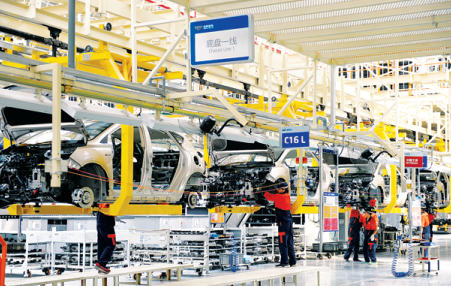Shanxi pushes energy revolution full steam ahead
Updated: 2021-09-03
Linfen
In the city of Linfen, local authorities' and businesses' efforts to help with the carbon peaking and neutrality goals are not limited to the coal-mining industry. High-energy-consuming industries like steelmaking are the targets of local low-carbon development plan.
Jinnan Steel and Iron based in Linfen's Quwo county, for instance, has used such technologies as 5G, big data and the industrial internet to help improve the efficiency of its production.
Executives at this privately run company said the digitalized production has significantly reduced the consumption of coke in steelmaking and the emissions of carbon dioxide and other polluting gas.
Through improving the efficiency of coke-consuming manufacturers, the city's coke output was reduced by 10.9 million tons in 2019 and 2020, accounting for 27 percent of the total reduced capacities in Shanxi.
Carbon reduction is also a highlight of the city's public service sector. All the buses for public transport have been electrified and cleaner energy like natural gas and solar energy is used for centralized heating, according to local officials.
Jinzhong

Workers assemble cars at Geely's new energy vehicle plant in Jinzhong. [Photo by Li Zhaomin for China Daily]
One of the proponents of the energy revolution in the city of Jinzhong in central Shanxi is hydrogen, a fuel with zero emissions.
A recent development is the construction of a hydrogen fuel cell production plant in the Jinzhong development area of the Shanxi Transformation and Comprehensive Reform Demonstration Zone. The plant is funded by Meijin New Energy.
"With an investment of 550 million yuan, the project has seen a majority of its structures completed," said Chen Zhizheng, a Meijin executive in charge of the new project. "The general assembly plant (for hydrogen-fuel-cell systems) began operating recently."
The Meijin plant mainly produces hydrogen-fuel-cell drivetrains and components for vehicles. Upon completion, it is expected to become the largest hydrogen fuel cell production base in China. It also has plans to develop and produce hydrogen-fueled commercial vehicles.
Jinzhong plans to develop itself into a new energy vehicle production hub in Shanxi by fostering an industrial cluster with an annual output value of more than 100 billion yuan. To date, more than 13 manufacturers and component producers, including Geely and SND New Energy Special Vehicle, have settled in the city.
Xinzhou
The city of Xinzhou is transforming its energy industry by increasing the proportion of new energy resources, such as wind power, for electricity generation.
According to the local government, Xinzhou's new-energy power generation capacity reached 8.44 million kilowatts by the end of 2020, accounting for 56.59 percent of its total power generation capacity. The ratio ranked it first in Shanxi.
Xinzhou is one of the key coal production bases in Shanxi. But the city began to reduce its reliance on coal in recent years by shutting down coal mines with outdated production facilities. As a result, its total number of coal mines has been reduced from 81 to 67 at present, with 81.8 percent of the total capacity being advanced and more efficient facilities.
The city is promoting intelligent coal mining, with 27 mining shafts planned to be digitalized.
Xinzhou is using cleaner energy, including natural gas and solar energy, to take the place of coal for heating in both urban and rural areas.
Shuozhou
The city of Shuozhou now eyes the energy storage industry as a new breakthrough point for its energy revolution.
Local industry insiders said the energy storage industry is crucial for the efficient operations of solar and wind power stations and the electric vehicle industry.
Energy storage facilities can help with stable power supply to grids.
A recent development is the construction of a 300-megawatt-hour power storage station funded by the local company of Jinfeng and the 400-800-mWh power storage stations built by Huashuo New Energy.
For power storage used for electric vehicles, Shuozhou's electricity companies are building a citywide network for charging and battery swapping. The network is connected to the internet, allowing users to access services easily, according to the city's officials.
Wang Pei and Li Shu contributed to this story.



